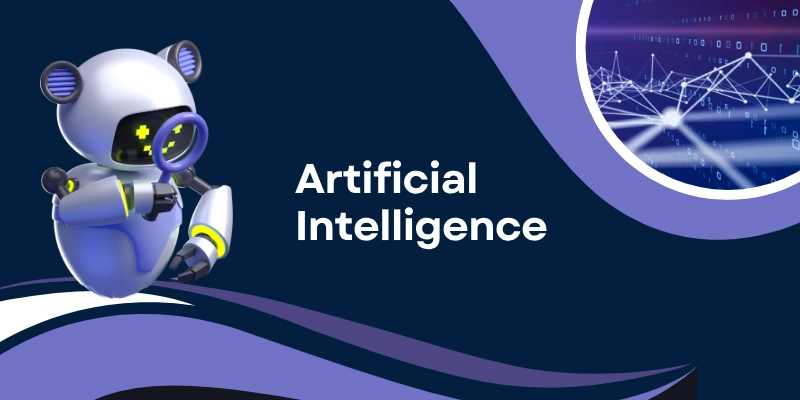What is Artificial Intelligence, and What are its Internet Applications?
Published: 26 May 2025
Artificial Intelligence (AI) is no longer science fiction—it’s part of our everyday lives, from the way we shop to how doctors diagnose diseases. By 2030, the global AI market is expected to hit a whopping $1.8 trillion, signaling just how fast this tech is being adopted across sectors.
But what exactly is AI? And how does it work?

In this blog post, we’ll break down everything you need to know:
- What AI is and how it works
- The main types of AI (Narrow, General & Superintelligent)
- Real-world applications in different industries
- Ethical and societal challenges
- What the future holds for AI
What is Artificial Intelligence?
At its core, Artificial Intelligence refers to machines that simulate human intelligence. These systems are designed to perform tasks like learning, reasoning, problem-solving, and even decision-making.
According to TechTarget, AI combines technologies such as:
- Machine Learning (ML): Algorithms that improve with experience (e.g., YouTube recommendations)
- Deep Learning (DL): Uses neural networks for complex tasks like image and speech recognition
- Natural Language Processing (NLP): Lets machines understand and generate human language (hello, ChatGPT!)
A Brief History of AI
The concept of AI dates back to the 1950s with Alan Turing’s famous question: “Can machines think?”
In 1956, the Dartmouth Workshop officially coined the term “Artificial Intelligence.”
Since then, AI has rapidly evolved thanks to powerful computers and access to big data.
Types of AI
AI can be categorized in two ways—by capability and by functionality.
Based on Capability
- Narrow AI (Weak AI):
Designed for specific tasks like facial recognition, voice assistants (e.g., Siri, Alexa) - General AI (Strong AI):
Hypothetical AI with human-like reasoning (we’re not there yet) - Superintelligent AI:
AI that surpasses human intelligence—a hot topic in futurist circles
Based on Functionality
- Reactive Machines:
Respond to inputs but can’t learn (e.g., IBM’s Deep Blue chess computer) - Limited Memory AI:
Learns from past data (e.g., autonomous vehicles) - Theory of Mind AI:
Still theoretical—would understand human emotions and intentions - Self-aware AI:
Conscious machines—purely speculative at this point
How Does AI Work?
AI systems follow a data-driven process, which typically involves:
- Data Collection: From medical records to consumer habits
- Model Training: Using algorithms to find patterns in the data
- Deployment & Inference: Applying these models to real-world tasks (e.g., fraud detection)
Key Learning Models
- Supervised Learning: Trained on labeled data (e.g., spam filters)
- Unsupervised Learning: Finds hidden patterns in data (e.g., customer segmentation)
- Reinforcement Learning: Learns through trial and error (e.g., AlphaGo)
Applications of AI
AI is transforming every major industry. Here are some key examples:
Healthcare
- Disease Detection: AI helps spot issues in X-rays and MRIs (e.g., IBM Watson)
- Drug Discovery: Accelerates research by predicting molecular structures
Finance
- Fraud Detection: Flags suspicious activity instantly (e.g., Mastercard)
- Algorithmic Trading: Executes high-speed stock trades using AI predictions
Education
- Personalized Learning: Tools like Duolingo adapt to each student
- Automated Grading: Frees up educators’ time
Autonomous Vehicles
- Self-driving cars (like Tesla and Waymo) make real-time decisions using AI
Customer Service
- AI chatbots like ChatGPT answer queries 24/7
Ethical & Societal Challenges
While AI offers major benefits, it also poses serious ethical concerns:
1. Bias & Discrimination
AI can mirror human biases—especially in facial recognition or hiring tools.
Fix: Use diverse data sets and run fairness audits.
2. Job Displacement
Millions of jobs could be automated away.
Fix: Focus on retraining and promoting human-AI collaboration.
3. Privacy Concerns
AI systems collect tons of personal data—raising issues of surveillance and misuse.
Fix: Enforce regulations like GDPR and the EU AI Act.
4. Autonomous Weapons
AI-driven weapons could raise global security risks.
UNESCO is calling for international AI ethics rules.
The Future of AI
What’s next for AI? Expect major developments in:
- Explainable AI (XAI): Helping humans understand AI’s decisions
- Quantum AI: Merging quantum computing with AI for insane speed and power
- Global AI Regulation: Governments setting boundaries for AI usage
Debates to Watch
- Will AI surpass human intelligence? (The Singularity)
- Can we build AI systems that are both powerful and ethical?
Conclusion
Artificial intelligence is a double-edged sword it can drive amazing innovations but also create new challenges. To make the most of this tech revolution, businesses, policymakers, and individuals must ensure AI is developed responsibly.
✅ Stay informed.
✅ Support ethical AI.
✅ Advocate for fairness, transparency, and human oversight.
The future of AI is unfolding and it’s up to us to shape it.
Share this article with others who want to understand how AI transforms our online experiences. Have questions or insights? Leave a comment below.
FAQs
Here are some frequently asked questions to help you better understand Artificial Intelligence (AI) and its various applications:
Artificial Intelligence (AI) refers to the simulation of human intelligence in machines that are programmed to perform tasks that typically require human cognitive abilities, such as problem-solving, learning, speech recognition, and decision-making.
AI works by using algorithms and data to simulate human thinking. It learns from large datasets, identifies patterns, and improves its performance over time through processes like machine learning and deep learning.
The main types of AI are:
- Narrow AI: AI designed to perform specific tasks (e.g., voice assistants, facial recognition).
- General AI: A hypothetical AI that can perform any intellectual task a human can do.
- Superintelligent AI: A future concept of AI that surpasses human intelligence in all aspects.
AI is used in social media for content recommendations, targeted advertising, sentiment analysis, and chatbots for customer support. It helps platforms personalize user experiences by analyzing preferences and behaviors.
AI itself doesn’t directly impact internet speed, but it can optimize certain tasks related to network management, such as traffic routing, identifying issues with network congestion, or optimizing server load balancing.
In e-commerce, AI enhances product recommendations, optimizes pricing, manages inventory, and personalizes marketing campaigns, leading to better customer experiences and increased sales.
While AI has the potential to offer significant benefits, there are concerns regarding privacy, security, and bias. Ensuring ethical use of AI, transparency, and robust security measures is essential to mitigate risks.
AI is used in healthcare for diagnostic assistance, personalized treatment plans, predicting patient outcomes, drug discovery, and virtual health consultations. It helps improve efficiency and decision-making in medical practices.
AI in cybersecurity helps detect and prevent threats in real time by analyzing vast amounts of data for unusual patterns and potential attacks. It can also automate responses to security breaches and identify vulnerabilities in systems.
While AI may automate certain tasks and job functions, it is also expected to create new job opportunities in areas like AI development, data science, and machine learning. The key is adapting to changes and focusing on skills that complement AI technology.

- Be Respectful
- Stay Relevant
- Stay Positive
- True Feedback
- Encourage Discussion
- Avoid Spamming
- No Fake News
- Don't Copy-Paste
- No Personal Attacks

- Be Respectful
- Stay Relevant
- Stay Positive
- True Feedback
- Encourage Discussion
- Avoid Spamming
- No Fake News
- Don't Copy-Paste
- No Personal Attacks





